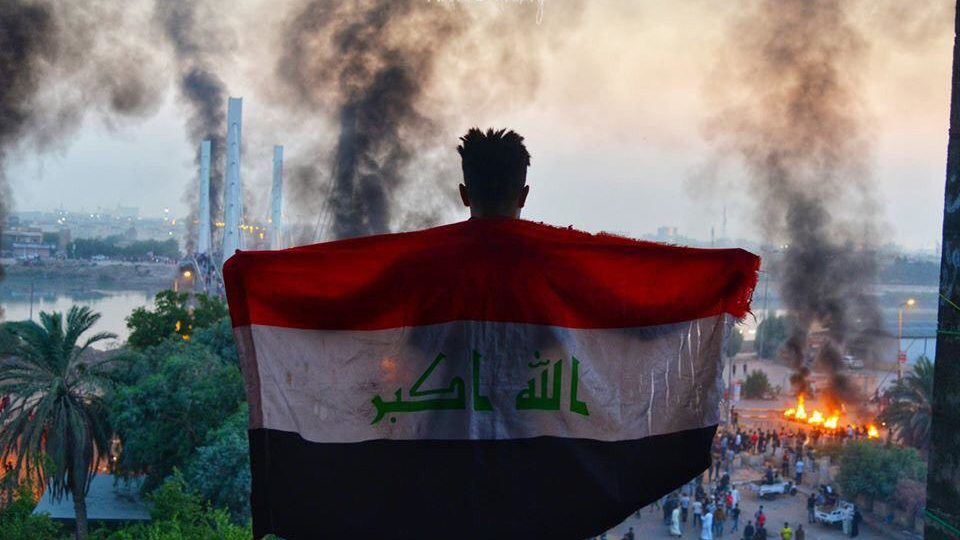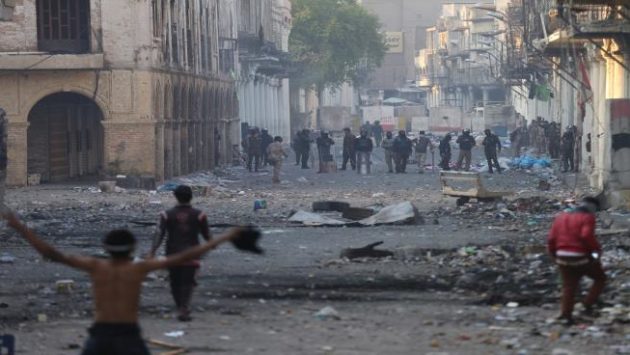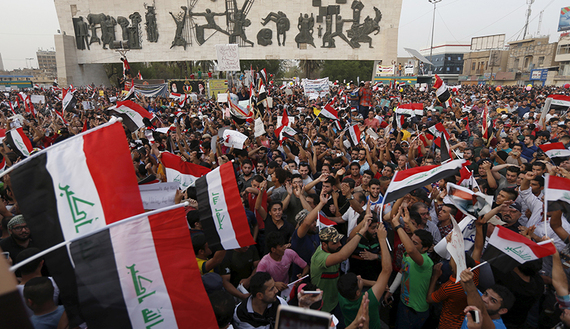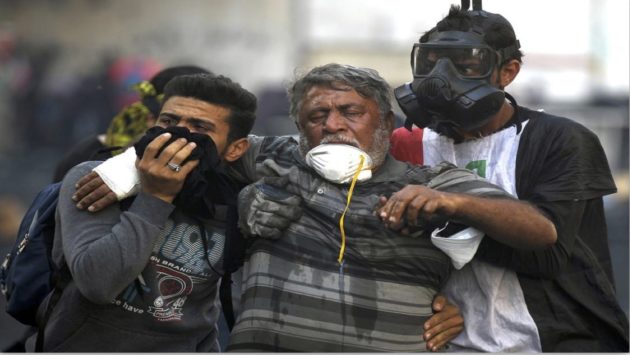Iraqi Protests Again… A Peaceful Call for Basic Human Rights is Met with Violence
Ahmed Alaa. A civil activist from Iraq
Ehab Hussein, 24 years old, experienced his first protest in early October 2019. He is an unemployed graduate of the Department of Chemistry Education, where he should have been a chemistry teacher. Instead, he became a street vendor. He and his brother support their family of seven through a small street stand they put together after their father was killed by a car bomb in al-Thawra in 2016. The protests offered Ehab an opportunity to voice publicly his objection to the government decision that led to the destruction of his stand, which prevents him and his family from securing what they need to survive. This poor young man took active part in the protests, carrying a sign that boldly stated: ” I want a job opportunity”.
Nonviolent action and forceful repression
Months before the nonviolent October uprising, dozens of young graduates demonstrated in front of several government departments to call for job opportunities. Initially responding with negligence and indifference, one of the security officers finally used hot water cannons to disperse the demonstrators. Pictures of the excessive force used on protesters were posted on social media which were received with outrage, resulting in calls to support the protestors and their cause. Demonstrations grew larger.
This round of Iraqi protests began on 1 October and within 2 days had doubled in size as hundreds of thousands of neglected and unemployed youth gathered in a number of public squares and along roads in Baghdad and the southern provinces. In the evening of that first day, the “strange and surprising” reactions to the nonviolent protests began. Abdullah Fouad, 22, reported, “We were shot by snipers who directly targeted us. At the same time, security forces started to shoot demonstrators in an arbitrary way using live ammunition. A lot of the young people around me dropped dead, I got out of the situation safely by a miracle after I hid behind a garbage container and then ran away to the house of one of my relatives. It was crazy, I had no idea when I went to the protests that I was going to be caught in a battlefield.”
Later, a spokesman from the security forces stated that the death toll during the protests had reached more than 100 young men and women, including a number of members of the security forces, and more than 6000 people wounded. Many activists, who chose to remain anonymous, accused militias linked to political parties in power and official security forces of carrying out the sniper and other attacks using live bullets. The story narrated by the government denied all this, insisting that the government did not know the identity of the snipers, that they had escaped, and that the government was still investigating military leaders on the use of live bullets against demonstrators. “The Commander-in-Chief of the Armed Forces, the Prime Minister, has formed a commission of inquiry into the incident,” government officials added.
Bloggers on social media accused the government of hampering the investigation by placing suspects accused of killing demonstrators on the committee created to investigate, such as Mr. Faleh al-Fayyad, head of the Popular Mobilization Force, which has militias.
Despite statements from representatives of the executive authorities — including the Prime Minister — insisting that they respect the right of free expression and peaceful demonstration, the reality of the situation was considerably different. TV channels and different media stations were subjected to raids, equipment was broken or sabotaged, and then carried out by unknown armed groups, according to official reports. Various bloggers on social media accused the Popular Mobilization Force and factions involved with it, noting the clothes that the group was wearing, and pointing out that these PMF forces were the same ones who had fired live bullets against the demonstrators and carried out kidnappings of activists. This was documented by surveillance cameras and protesters’ phone cameras. People published these revealing videos on social media and other websites. In response, the government cut internet access for days in order to stop the spreading of this critical and damning evidence.
Demands of protesters
Above all else, young protesters have been calling for job opportunities. Official data from the Central Bureau of Statistics indicate an unemployment rate of more than 15%, while independent observers believe this is far too low and that a real count suggests that “more than 9 million Iraqis are unemployed.” Failing to find new jobs in either the public and private sectors, many capable, young people have been left stranded, forced to take just about any job to secure a living. After the recent campaign implemented by the government to rid the streets of all vendors and stands, the lives of these unemployed youth are under serious threat. Economic and social policies have burdened them and their families, sending them into a state of poverty. At the same time, those lucky enough to have wealth and power have gained still more wealth and power, reaching the top of the political pyramid by strategically manipulating national, religious and sectarian emotions. These people have created a corrupt system based on “ethnic-religious-sectarian” quotas, and by looting public money, they have ensured benefits for themselves. As the majority of Iraqis struggle to make ends meet, they have made fortunes, increasing the gap, and exacerbating the tensions between rich and poor.
“The current regime is now 16 years old, and I have not seen anything in all my life but pain and suffering, I lost my father and there is no chance of survival unless the conditions of life change for the better,” Ehab says. “This system has stopped us from achieving our ambitions as an Iraqi people. It did not provide us with the necessary minimum living conditions, neither job opportunities, nor safety and the provision of basic services. Such a system has to be changed from its roots in order to create a more just system.” he added.
Response from government
Although the government and parliament have announced many measures to try to ease the situation, promises after the previous protests have been left unkept. As people return home, Abeer Ali, 33, reflected, “The situation has continued as it was after our protests in 2011, 2013, 2015 and 2018, that is, those in power limit job opportunities, benefit from endemic corruption and continue to loot public funds. They have categorically failed to address political, economic and social crises.” The demands from the street, from everyday Iraqi people, for example, for job opportunities, are not solved by hiring more young people to join the security forces, but only by reinvigorating Iraqi industries and rebuilding Iraqi infrastructure.
The current crisis is the greater than the regime has ever reached, The government cannot solve the crisis by paying lip service to the needs of the Iraqi people. What is required is a honest and rigorous review of the structure of the system itself. That is, the sectarian and ethnic quota system, in place since 2003, must be abandoned if the crisis is to be resolved efficiently and with integrity.
Continued action
Despite the brutal crackdown on demonstrations, peaceful protest continues. Activists uphold their right to freedom of protest in accordance with Article 38 of the Iraqi Constitution. Meanwhile the government justifies its violent response to them citing fear of “terrorism” and “infiltrators”. The right to express opinion freely and openly has come into direct conflict with security concerns, and a tug of war continues. The protesters assert that they will continue to move until they have built a “respectable homeland,” proclaims a banner flying in Tahrir Square in central Baghdad.
Ehab and his friends from the city of Althwra are well-prepared to demonstrate nonviolently. He says, “We are armed with Iraqi flags, soft drinks and masks so we are ready to meet the evil smoke bombs that may be fired at us with or without reason.” When we asked him about snipers or live bullets, he said, “I don’t fear them, I have nothing to lose.” With pain, he then joked that, on the contrary, if he was martyred, he would save his family the cost of his living.




